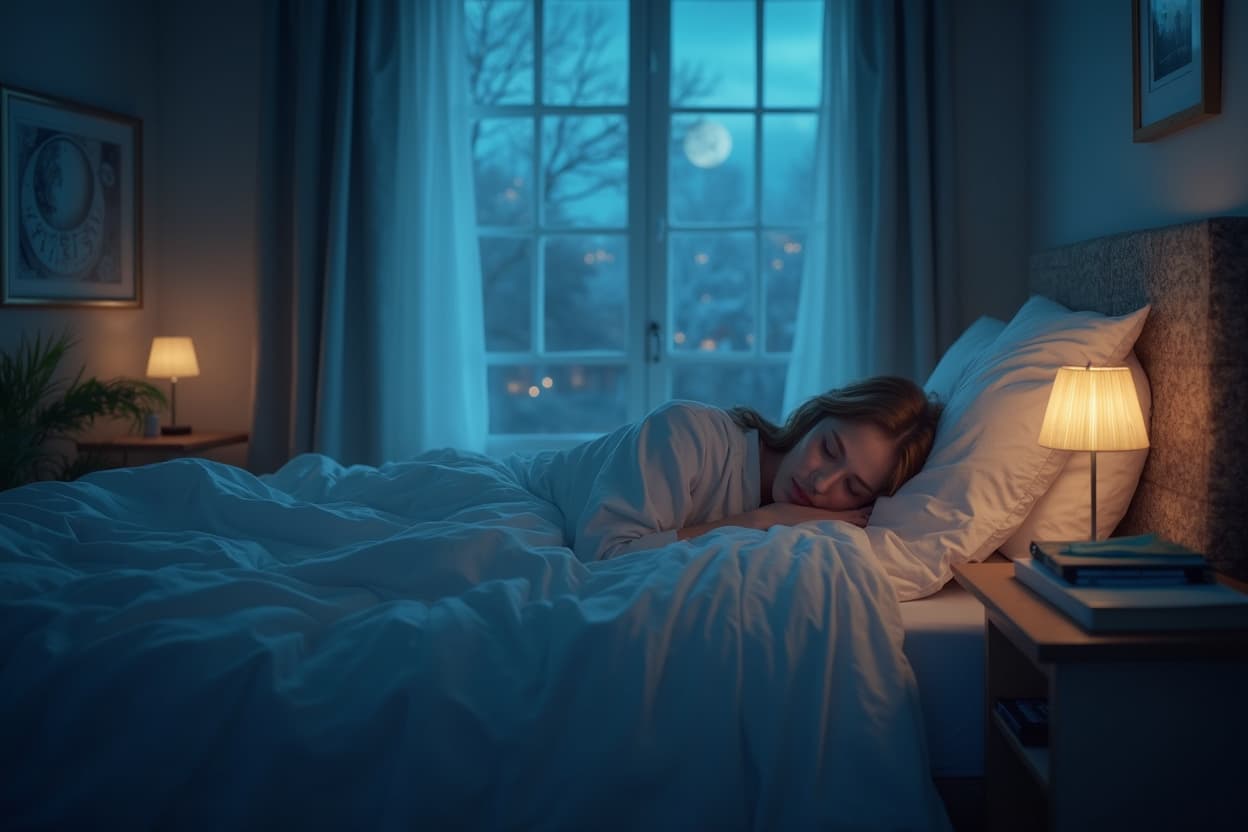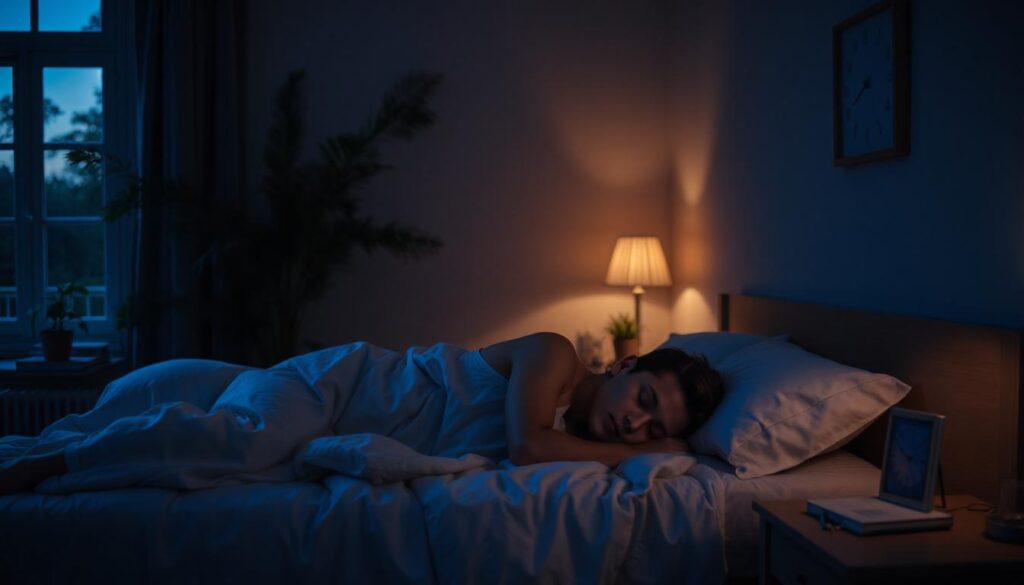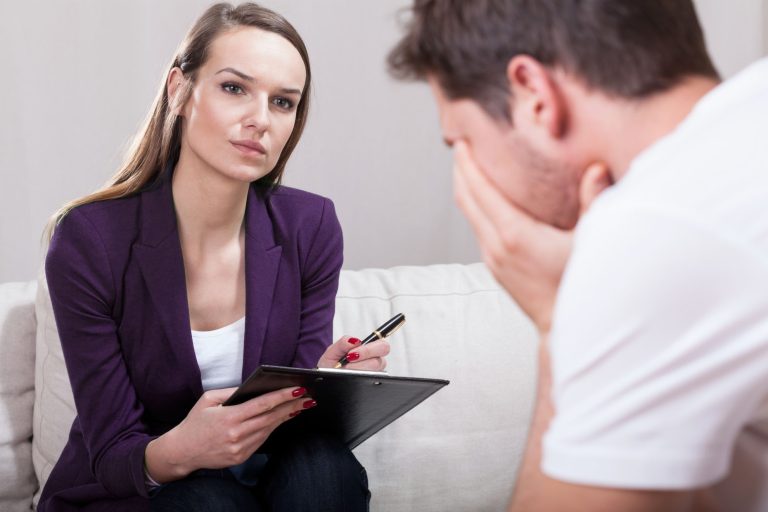The Psychology of Sleep: How to Improve Your Sleep and Fall Asleep Quickly

Sleep is one of the cornerstones of mental and physical health, but it eludes many. But insomnia, lack of sleep, or inconsistent schedules keep millions awake, night after night.Sleep research shows how important it is to emotional regulation, memory consolidation, and well being. Sadly, this poor sleep can create a domino effect that will lead to stress, poor focus and even you develop chronic health issues. In this article, we will explore the psychology of sleep and give you some actionable strategies for getting better sleep and falling asleep faster. Starting with simple tips like improving your sleep environment to more advanced psychological techniques like cognitive behavioral therapy for insomnia (CBT-I), you’ll find evidence-based ways to help improve your sleep quality and overall health.
Understanding the Psychology of Sleep
How Sleep Affects Your Brain and Body
Sleep is not just rest: it’s active and your brain and body are doing important things. Sleep repairs tissues, strengthens the immune system, balances hormones, and consolidates memories, processes emotions, and removes toxins.
Regulation of Sleep by Circadian Rhythms
Your circadian rhythm (also called your 24-hour clock) is at the heart of your sleep wake cycle, and it is run by the brain’s suprachiasmatic nucleus. This rhythm reacts to external cues like light and darkness as it tells your body when it’s time to wake up or sleep. This rhythm can get thrown off balance by disruptions, such as late night screen use (read lights, work lights, tablet use) or jet lag.
Sleep Cycles: REM and Non-REM Stages
There are several cycles of sleep, each taking between 90 minutes. NonREM (non-rapid eye movement) and REM (rapid eye movement) sleep occur in these cycles, alternating between them. They serve separate purposes for the brain and body at each stage, and they are, therefore, essential to optimal health.
Non-REM Sleep
Non-REM sleep is the initial phase of each sleep cycle and consists of three stages:
Stage 1: Light Sleep
- It happens just before you go to sleep and lasts only a couple of minutes.
- Your body relaxes, and your brain activity slows down.
- This is the stage where it’s easy to be awakened because you are only becoming deeper in sleep.
Stage 2: Stable Sleep
- Just a deeper sleep, your body temperature drops, your heart rate slows.
- Brain activity bursts (sleep spindles) happen, thought to help with memory consolidation.
- Most of your time sleeping happens here.
Stage 3: Deep Sleep
- Another term for slow wave sleep (SWS), or delta sleep because of slow brain waves present.
- Most of the body’s physical restoration goes on here, repairing tissues, bolstering the immune system, and releasing growth hormones.
- When you wake up from this stage, it can leave you feeling groggy as your body has the best opportunity to heal.
REM Sleep
REM sleep is the final stage of the cycle and is dramatically different from Non-REM sleep:
- During most vivid dreaming brain activity increases, such as that during wakefulness.
- With atonia, the temporary paralysis of most muscles that prevents you from acting out your dreams, the body is at war with itself.
- REM is important for emotional processing, learning, and memory consolidation and therefore, a critical stage for cognitive health.
- Each successive cycle during your night actually increases the duration of REM sleep.
The Importance of Cycling Through All Stages
- You have to sleep a complete night and go through all the stages at least more than once, each is important in maintaining mental and physical health.
- Deep sleep (Stage 3) is missing out on which can cause physical fatigue and weak immunity.
- REM sleep skipping affects emotional regulation and memory retention, and can result in irritability and forgetfulness.
The Science of Falling Asleep
Melatonin and Cortisol Regulation of Sleep.
Sleep regulation is mainly dependent on hormones melatonin and cortisol. The sleep hormone melatonin rises as night picks up, telling your body it’s time to rest. Cortisol — the stress hormone — is at its peaks in the morning, helping you wake up; when elevated at night due to stress or anxiety it can interfere with sleep.
The Psychological Effects of Sleep Deprivation
Sleep deprivation is more than just making you tired. Lack of sleep hurts your prefrontal cortex and renders your brain unable to make decisions effectively, focus, or become creative. The amygdala gets emotionally heightened, which makes you more reactive and more stressed, and more irritable and more prone to anxiety or depression.
Why Sleeping Well Matters for Emotional and Mental Well Being
Bad sleep pulls the rug out from under us emotionally. Meanwhile, studies show that insufficient sleep makes mood disorders worse, reduces resilience to stress and damages social interactions. Thus, while increasing sleep can boost cognitive function, enhance emotional stability, and even make you feel more grateful about life, all in all you want improved sleep.
Common Causes of Poor Sleep
Psychological Factors: Stress, Anxiety, Racing Thoughts
It’s late, the house is quiet and you’re trying to lie down to rest. Suddenly, your brain won’t drift off, they’ve decided it’s time to rehash all the mistakes you’ve ever made, and remember to worry about tomorrow’s deadlines. Sound familiar?
Some of the most common interruptors of sleep are stress and anxiety. His body kept him awake, pumping out cortisol (the stress hormone that shouldn’t make you fall asleep). Unfortunately, this stress-sleep cycle can quickly become a vicious loop: More stress leads to poor sleep, which leads to more stress.
There are even greater effects on the people with chronic anxiety or depression. The anxiety can also stop you from falling asleep and depression can result in sleep that is fragmented or not able to wake up. Again, the first step of really getting free is to recognize these patterns.
What You Need to Know About Sleep Environment
Have you ever struggled all night with an over-lighted room or a noisy neighbour? What you make of your bedroom may bear more influence on your sleep than you imagine.
- Noise: This turn will occur even if you are in deep sleep; even the smallest sound, for example, the hum of the air conditioner or a car horn from the block away, is sufficient to wake you up. Any sound that comes in is poignant because your mind still expects the next sound to come through.
- Light: Our brains are programmed to follow natural light patterns. They shock your systems awake, so to speak, especially if you’re looking at the blue wavelengths emitted by phones, TVs and other sources in the hours before bedtime.
- Temperature: Do you ever wake up in a sweat or perhaps covered in goose bumps? Your body requires a cool but comfortable environment in order to sustain sleep. In particular, it is advised to maintain the room temperature at something between 60-67 degrees F (15-19 degrees C).
In order to counter these disruptions here is my suggestion: “Your bed room should be seen as the place where sleep happens.” Use a black out curtain, avoid noise with ear plugs or white noise, set temperature to the comfort level.
How Small Habits Can Sabotage Your Sleep
Little habits that sneakily chip away at your sleep quality can sometimes be the not the big things.
- Late-Night Snacking: If you have a heavy or greasy meal right before bed, your stomach will stay working overtime when your body should be relaxing. Choose yogurt or a banana when wanting to nip hunger in the bud without crashing sleep.
- Irregular Sleep Patterns: If you stay up late on the weekends or sleep in too much, it makes it harder to fall asleep on weeknights, because your body’s internal clock is thrown off. Consistent schedules mean you’re regulating your sleep cycle morning and night, including weekends.
- Technology Overload: This doesn’t mean that scrolling through your phone or watching a show in bed won’t let you relax, but it overstimulates your brain and makes it harder to fall asleep. Plus, that blue light screens give off tricks your body into staying up later.
If you address these habits, you’ll see a huge difference in how fast and easy you fall asleep.
Disruptive Medical Conditions That Affect Sleep
Sleep problems aren’t just about habits or environment for some people: They can be connected to underlying health conditions.
- Sleep Apnea: If you snore loudly, are constantly tired, and get “enough sleep,” you may have sleep apnea. This condition results in brief stops in breathing that mess with your sleep cycles and leave you feeling groggy.
- Restless Leg Syndrome (RLS): It can be all but impossible to fall asleep with an irresistible urge to move your legs at night. This neurological condition is frustrating and often misunderstood.
- Chronic Pain: Your bed becomes uncomfortable rather than restful if you have conditions like arthritis, migraines, or back pain. Ways to manage pain before bedtime really can make a big difference.
If any of these sound familiar, it might be time to start talking to a sleep specialist or doctor to help guide what steps to take next. Dramatically improving your quality of rest means tackling the root cause.
Why Sleep Problems Happen and How to Take Back Control?
The first step to change is to understand why you struggle with sleep. The issue may be stress, a disruptive environment or even an undiagnosed medical condition so identifying root cause can help you to target solutions effectively. Sleep is vital, and with a few adjustments you can strip away the clutter to make room for better nights and brighter days.

Tips for Better Sleep
Have a consistent sleep schedule.
Routine is your body’s internal clock’s, circadian rhythm’s happy place. Regular bedtime and wake up times, even on weekends, help set your body’s sleep and wake cycle (often called your ‘circadian rhythm’), so you fall asleep and awaken easier and more naturally.
First, determine a realistic bedtime and wake time in line with your lifestyle, and you ought to be shooting for somewhere between 7 and 9 hours. To alter your schedule, bud your way into it by rolling back your bedtime in 15 minute increments over several days until you reach your desired condition. Consistency is key.
Pay Attention to What You Eat and Drink
Your sleep quality can depend highly on what you consume during the day.
- Avoid Heavy Meals Before Bed: A large, greasy or spicy meal can interfere with digestion and an effort to relax. Instead choose a lighter dinner at least 2–3 hours before bedtime.
- Limit Caffeine and Alcohol: Coffee, tea and soda can contain caffeine that stays in your system for hours, hampering your ability to unwind. Similarly, alcohol gives you a fuzzy sense of being drowsy, but disrupts real REM sleep leaving you less rested.
- Stay Hydrated but Wisely: It is essential to drink water. but too much water right before bed could force you to go to the bathroom so many times. If possible, balance hydration earlier in the day so you’re not forced to stop later.
Magnesium or tryptophan rich foods like bananas, almonds or a small bowl of oatmeal are good pre sleep snack options.
How to Enhance Your Sleep Environment
Design the bedroom as a place of rest instead of just a room.
- Darkness Matters: Avoid exposing yourself to light before bedtime, ideally get a pair of high quality opaque curtains or an eye mask.
- Silence or Soothing Sounds: Avoid using loud music or loud speakers so as come up with less loud environment like using ear plugs or the white noise machine.
- Temperature Control: Environment your room temperature slightly lower – Perfect range should be between 60-67o F or 15-19 o C. A warm blanket and free-flowing night clothes also helps, according to a recent survey.
- Declutter Your Space: Clutter will breed chaos and as such it’s wise to ensure that your sleeping area is as clean as is possible.
Create a Relaxing Pre-Bedtime Routine
Taking time to relax before bedtime helps signal to your body that it is time to sleep.
- Unplug From Screens: Remember to switch off anyone electronic gadget that may display blue light at least one hour to bedtime. But before that take a book to read or listen to some quiet music.
- Practice Relaxation Techniques: Practicing gentle movements such as yoga, or simple breathing exercises such as pranayama or guided meditation can ease your body in to relaxation.
- Take a Warm Shower: Pre-sleep bath has the advantage of soaping the muscles and making the body drowsy as it cools down after bath.
How to Manage Daily Habits for Better Quality Sleep
How well you can sleep at night depends a lot on what you do during the day.
- Natural Light: Your circadian rhythm needs to be regulated, and being exposed to sunlight during the day makes it easier for you to sleep when night comes.
- Exercise Regularly: But vigorous workouts too close to bedtime also affect sleep quality, as does physical activity. Instead, go for morning or early afternoon exercise.
- Limit Naps: A long or late nap done in the middle of the night can negatively affect sleep by interfering with night time sleep. Naps work, so, if you need one, keep it under 30 minutes and do it when you need the energy the most — in the morning.
Do not Rely on Sleep Medications
Sleep aids may sound like the easy solution, until you realize that they can be risky, such as dependency or the next day feeling groggy. If you’re thinking of using sleep medication, first consult a doctor. Natural alternatives such as herbal teas (chamomile), aromatherapy (lavender) etc can have a calming effect and you can explore these!
Sleep Comfortable and Breathable Sleepwear
Not only can you make surprising choices for your sleepwear, but you can choose well! Soft, natural fabrics like cotton are the best options for your body to breathe and ensure you can control your body temperature.
Why These Tips Work?
Small, well planned changes can greatly improve the sleep quality you get. The thing is by building a routine, creating the right environment, practising healthy habits, you are giving your mind and body the tools to rest and to recharge.
Additional Strategies Backed by Psychology
Cognitive Behavioral Therapy for the Insomnia (CBT-I)
A CBT-I is a gold standard, research-backed method to manage long-term sleep issues. Unlike medication, CBT-I (Cognitive Behavioral Therapy for the Insomnia) addresses the way underlying thoughts and behavior behavior disrupt sleep.
How It Works?
This kind of CBT-I identifies and reframes negative thought pattern about sleep, like “I’ll never fall asleep tonight,” which creates anxiety and makes it more likely to have trouble sleeping.
Behavioral Changes
Sleep and intimacy can only be done (or even be rewarding) in bed, which makes beds good for productive sleeping, or stimulus control. And sleep restriction therapy (limiting time in bed to increase sleep drive) reprograms your body to view bed as synonymous with rest.
Why It’s Effective?
Long term, CBT-I studies show it improves sleep — by reducing the frequency of insomnia episodes.
If you are having persistent sleep problems, working with a trained CBT-I therapist can change your life.
Guided Imagery and Visualization
Visualization is a great relaxation technique which helps your mind and body to relax, in so doing you imagine calming, peaceful scenes.
How to Practice?
Imagine a place you can see closed your eyes such as a beach at sunset or a forest. Listen to the waves, experience the breeze, and smell the salty air.
Why It Works?
Thus, visualization acts to distract your mind from racing thoughts and engage parasympathetic nervous system – one that puts you in a state of relaxation and prepares you for sleep.
To have specific guidance, you can look at apps or YouTube videos that offer free guided imagery sessions for sleep.
Gratitude and Positive Reflection
That just focusing on what you’re grateful for will help you to sleep well.
How to Do It?
Just before bed, write down 3 or 5 things you’re grateful for, or think about some good things that happened during the day.
Why It Works?
This fosters gratitude, putting your focus in a different direction, which eliminates worries and open positive emotions allowing you to become stress free.
Including gratitude in your nightly routine is a very low key way to quiet your mind.
Mindfulness and Meditation for Sleep
Mindfulness meditation is a process of paying attention, on purpose, in the present moment, and without a judgmental attitude. For those with trouble settling down at bedtime, especially those experiencing stress or racing thoughts, it’s particularly effective.
Simple Mindfulness Practice
- Sit or lie comfortably.
- Just concentrate on your breath coming and going.
- If your mind starts to wander, come back to your breathing.
Body Scanning
A second way is to have yourself mentally scan your body from head to toe and notice tense areas and consciously relax them.
Practice makes your brain let go of stress and sleep effortlessly.
Self Awareness and Sleep Tracking
Understanding your sleep patterns will allow you to make better decisions to help you get better rest.
- Use Technology Wisely: Sleep Cycle, a superb app, will track your sleep stages, wake times and disturbances as well as devices like Fitbit, will track those same things.
Caution: Sleep trackers can be invaluable, but don’t obsess over the data, it’s not going to get you there. But use it as a tool to be aware of how you are doing, not as a means to be perfect.
Aromatherapy and Calming Scents
To that end, aromatherapy builds on the therapeutic use of fragrances to deliver relaxation. Lavender, chamomile, and sandalwood are some of the most popularised oils for sleep.
How to Use It:
1. Put a few droplets of the oil into the diffuser, you have on your bedside table.
2. Apply it directly to your pillow at night, and you can also add a drop to your carrier oil for a massage.
Why It Works: In some cases there is a cause and effect where some scents lower the rate of your heart and breathing rate, telling the body it is time to relax.
Why Psychological Strategies Matter?
Contrary to such mask Randolph’s mechanical solutions, these approaches regulate the mind-body axis, weigh up the psychological obstacles to sleep. By incorporating these strategies into your lifestyle, therefore, you are not only promoting sleep, but the general mental and physical health of a person will be provided.
Important Considerations for Specific Groups
Sleep Tips for Shift Workers
The sleep challenges that shift workers, including nurses, factory workers, and emergency responders, often experience tend to be unique.
- Stick to a Schedule: Even with unconventional hours, maintaining a consistent sleep routine helps your body adapt. If you’re not getting enough nighttime sleep, try using blackout curtains and a white noise machine to mimic those nighttime conditions during the day.
- Careful Caffeine Use: Don’t consume caffeine 4 to 6 hours before your sleep time. The lingering effects of it can cause you to fall asleep, but only during work hours.
- Light Exposure: Staying alert? Use bright light during your shift, and avoid light on the way home to tell your body it’s time to wind down.
Sleep – Teens vs. Seniors: How Age Affects Sleep
Teenagers?
- Teens are naturally shifting their circadian rhythm and sometimes require later bedtimes and wake up times. Aid them to get in the habit of going to bed and waking up at the same time each day, and cut down on evening screen time to encourage falling asleep earlier.
- Early school start times make many teens sleep-deprived. Advocacy for later start times is gaining traction to improve teen health.
Seniors:
- People as they age spend less deep sleep time and wake up more frequently during the night. A good pre bed routine and addressing health issues like pain or medication side effects can improve sleep quality.
- Ask that they do light exercise, such as walking, to help regulate their sleep wake cycle.
Sleep Patterns between Males and Females
Men and women experience sleep differently due to hormonal and physiological factors:
Women: Changes of the hormones in menstrual cycle, pregnancy and menopause can disturb the sleep. For instance:
- Pregnancy-related discomfort, and frequent bathroom trips also interrupt rest.
- Insomnia or night sweats are often reported by post menopausal women. Hot flashes can be countered by cooling sleepwear or changing rooms.
Men: Sleep apnea, the condition of interrupted breathing and sleeping cycles that affects more men than woman, is more common in men. Loud snoring or excessive daytime fatigue may be treated with CPAP therapy; seeking medical advice may help you find out.
Why Tailored Advice Matters?
However, sleep can be a challenge in each group. Knowing these differences means you can develop personalized strategies for individual needs: a teenager with night homework, a shift worker who is working an unconventional schedule, or an older person who has to adjust to age related changes.
When to Get Help from Professionals
Knowing the Signs of Long Term Sleep Disorders
Occasional restless nights are normal, but when sleep issues persist, they may signal a deeper problem. Consider seeking professional help if you experience:
- Persistent difficulty falling asleep throughout the week (at least three days a week) lasting more than three months.
- Sleep problems negatively impact an individual’s personal, social, and professional functioning.
- Gasping for air, loud snoring, or choking while sleeping (all indications of sleep apnea).
- The symptoms include uncontrollable urges to move your legs at night (restless leg syndrome).
- Unusual bedwetting or nighttime urination, or possible sleepwalking or talking, nightmares or other unusual behaviors while sleeping.
Consulting a Sleep Specialist or Psychologist
The sleep specialists, psychiatrists, and psychologists are skilled in diagnosing and treating sleep disorders.
- Sleep Studies: Overnight monitoring can identify sleep apnea and REM sleep disorders as problems.
- Cognitive Behavioral Therapy for Insomnia (CBT-I): However, by working with a sleep specialist or professional psychologist, you can break old negative thought pattern and practice healthier sleep habits.[1]
- Medications: Some sleep disorders such as narcolepsy can be treated or otherwise improved by psychiatrists prescribing necessary medications.
If you don’t know which specialist to go see, so I would advise going to your primary care doctor and having him or her refer you to a seasoned specialist.
Don’t Wait to Take Action
Sleep is important to a persons psychological and physiological health and any sleep disorders should be treated before they worsen. To wit, bleak hours direction, pressure administration, environment modification, as well as seeking expert help can create considerable positive effects to lifestyle.
Conclusion
Review: Your Road to Improved Sleep
We will review the principles of sleep psychology and offers solutions that will assist you in getting a better night’s rest and going to sleep more quickly. From waking time routine to maintaining an appropriate ambiance for sleep to practicing meditation to seeking professional help when you cannot manage on your own, these assets can change your approach to sleep.
The Benefits of Getting Adequate Sleep
Sleeping is not a privilege, it is a requirement. By giving importance to sleep, you are really banking on one’s wellbeing, outlook towards life, and efficiency at work. You know, even these tiny changes, gradually can make very significant changes.
What’s your go-to sleep tip? Put it in the comments section below! So, if you found this guide useful, share it with someone you know could use it. Let’s make better sleep a goal everyone can achieve.
People also ask (FAQ)
Sleep plays a critical role in regulating emotions, managing stress, and supporting memory and learning. Without adequate sleep, the brain struggles to process information, and the risk of anxiety, depression, and other mental health issues increases.
Most adults need between 7-9 hours of sleep per night to function optimally. However, individual needs may vary based on age, lifestyle, and health conditions.
This could be due to several factors, including stress, anxiety, or irregular sleep patterns. Other contributors may include consuming caffeine or alcohol before bed, exposure to blue light from screens, or an uncomfortable sleep environment.
Melatonin is a hormone produced by the brain in response to darkness. It helps regulate your circadian rhythm, signaling to your body that it’s time to sleep. Exposure to artificial light can reduce melatonin production, delaying sleep onset.
Stress activates the body’s fight-or-flight response, increasing cortisol levels and making it harder to relax. Chronic stress can disrupt the sleep cycle, leading to insomnia and poor-quality sleep.
Short naps (20-30 minutes) can be beneficial, improving alertness and reducing fatigue. However, long or late-afternoon naps can interfere with nighttime sleep by reducing your sleep drive.
Yes and no. Sleep tracking apps and white noise generators can be helpful, but too much screen time before bed can expose you to blue light, disrupting your natural sleep signals. Use technology wisely and turn off screens at least an hour before bedtime.
Cognitive Behavioral Therapy for Insomnia (CBT-I) is a structured, evidence-based therapy that addresses negative thoughts and habits that interfere with sleep. It’s highly effective for treating chronic insomnia.
Ensure your bedroom is dark, quiet, and cool. Use blackout curtains, minimize noise with earplugs or white noise, and keep the temperature between 60-67°F (15-19°C). Comfortable bedding and a clean, clutter-free space also help.
If you have persistent trouble falling or staying asleep, loud snoring, or excessive daytime fatigue despite adequate sleep, it’s time to consult a sleep specialist or doctor. These could be signs of a sleep disorder like insomnia, sleep apnea, or restless leg syndrome.



